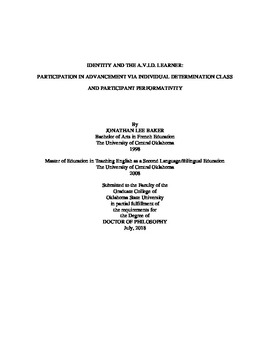| dc.contributor.advisor | Brown, Pamela | |
| dc.contributor.author | Baker, Jonathan Lee | |
| dc.date.accessioned | 2019-03-20T19:25:37Z | |
| dc.date.available | 2019-03-20T19:25:37Z | |
| dc.date.issued | 2018-07 | |
| dc.identifier.uri | https://hdl.handle.net/11244/317642 | |
| dc.description.abstract | This study investigates the influence of the Advancement Via Individual Determination (AVID) program on participants who have taken it as an elective course for at least one year in high school and who have gone on to complete at least two years of higher education. Participants describe their experiences in terms of the way they saw/see themselves as learners, as students and as members of communities. Using a narrative inquiry approach to analysis and a poststructuralist theoretical framework influenced by Judith Butler's work in the field of gender identity, participants' experiences are examined with an eye toward the ways in which their AVID participation had a role in the way they perform their identity and how they see themselves as acting and reacting in the performative aspects of their home selves, high school selves and college selves. In examining the narratives of participant experiences, particular attention is paid to the ways in which they mold their views of themselves and others' views of them into a set of values that, in their telling, sets them apart from who they had been and from others similarly situated who did not have the AVID experience (the high school self). It also sets them apart from their families (the home self), whose lack of knowledge and understanding of the process of becoming first-generation college students inhibited their ability to understand and effectively advocate for their children. It did, however, connect them to the kinds of cultural capital that would improve their ability to perform as higher education expects of undergraduates (the college self). | |
| dc.description.abstract | The findings of this research center on the interplay between internal agency and external influence as they combine to create participants' views of their own identities and can be seen through their attitudes and actions as they pursued undergraduate degrees. An implication of this work is the idea that AVID serves as a bridge of sorts which connects the agent desiring to be with the society which expects it to be. | |
| dc.format | application/pdf | |
| dc.language | en_US | |
| dc.rights | Copyright is held by the author who has granted the Oklahoma State University Library the non-exclusive right to share this material in its institutional repository. Contact Digital Library Services at lib-dls@okstate.edu or 405-744-9161 for the permission policy on the use, reproduction or distribution of this material. | |
| dc.title | Identity and the A.V.I.D. learner: Participation in Advancement Via Individual Determination class and participant performativity | |
| dc.contributor.committeeMember | Kearney, Kerri | |
| dc.contributor.committeeMember | Wang, Hongyu | |
| dc.contributor.committeeMember | Castle, Kathryn | |
| osu.filename | Baker_okstate_0664D_15817.pdf | |
| osu.accesstype | Open Access | |
| dc.type.genre | Dissertation | |
| dc.type.material | Text | |
| thesis.degree.discipline | Education | |
| thesis.degree.grantor | Oklahoma State University | |
